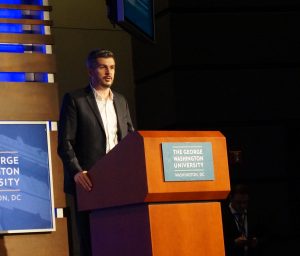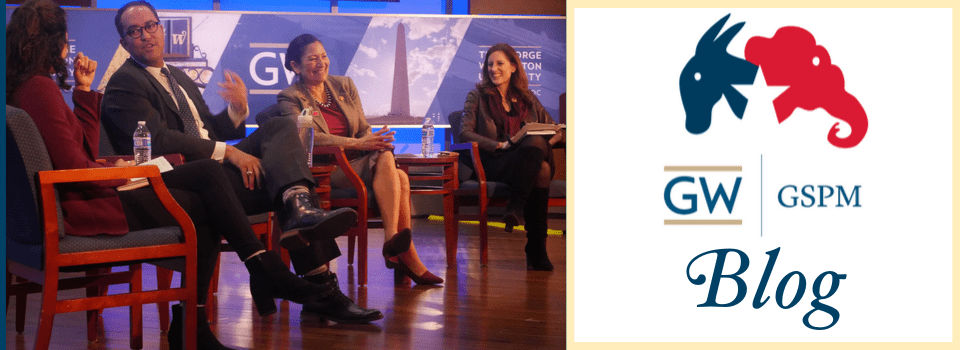The following post is from GSPM Research Director Prof. Michael Cornfield
In the space of three weeks Senator Al Franken (DFL-MN) plummeted in public standing from a presidential mentionable to a disgraced official on the verge of departure. Some blame his Democratic colleagues for abandoning him in the interest of political expediency. A review of Franken’s remarks indicates that the bulk of the responsibility belongs with him.
Al Franken was the first in the post-Harvey Weinstein sleaze parade to give a speech about his scandalous predicament. Previous celebrities exited in silence or under cover of brief released statements expressing combinations of apology, self-defense, and promises to rehabilitate, with the notably defiant exceptions of Roy Moore and Donald Trump.
The Leeann Tweeden accusation hit on November 16, fortified by an incriminating photo. Franken questioned her interpretation of their encounters but apologized, in public and in personal communications (as he told the public). She accepted his apology. So far, so good.
Senators McConnell and Schumer initiated a Senate Ethics Committee review of the incident. Franken embraced the move and went silent under the pretext that the review would afford him “due process.” This damage control strategy was terribly flawed. More accusations surfaced, turning a one-off incident into a pattern that a fuller statement by Franken about his behavior in his pre-Senate days could have mitigated.
It’s also hard to see how a Congressional panel could rule fairly on he-said she-said conduct that occurred before the accused was a member of the body to whose rules he would be accountable. A more cynical perspective would interpret the referral as a stall. Given the performance of Congress in recent years, earning the institution job approval ratings in the same number range as the age of Roy Moore’s victims, cynicism is justified.
Twitter data show the stonewall held for a short while. Here are the number of times Franken’s name was mentioned between November 16 and December 5. The public eye went elsewhere, even on November 23 when Franken surfaced to issue what now sounded like excuses: "I've met tens of thousands of people and taken thousands of photographs, often in crowded and chaotic situations. I'm a warm person; I hug people. I've learned from recent stories that in some of those encounters, I crossed a line for some women — and I know that any number is too many.” In other words, only under public scrutiny did Franken become aware that there are certain places his hands and tongue should not go when he was in close proximity to women.

On December 6, the wall collapsed. A seventh accusation appeared in Politico, and it came from a Congressional staffer. Time valorized the “silence breakers” as “Persons of the Year.” Senator Kirsten Gillibrand declared that “enough is enough” and called for Franken to resign. A cascade of more than thirty Senatorial dittos fell within hours.
Senator Franken now had a huge audience for his goodbye and, if he chose, a farewell address that would put his troubles in a larger context.
------
He opened well, harkening back to the post-Weinstein pre-Tweeden weeks:
We were finally beginning to listen to women about the ways in which men's actions affect them. The moment was long overdue. I was excited for that conversation and hopeful that it would result in real change that made life better for women all across the country and in every part of our society.
Then the conversation turned to me, Franken continued, and I was shocked. In being a respectful listener “I think it gave some people the false impression that I was admitting to doing things that in fact I haven't done.”
Franken was walking back his culpability as a misunderstanding on the part of “some people,” as the hellacious price paid by a well-intentioned “respectful listener.”
He then widened his attention from himself to include two other accused sexual harassers:
I of all people am aware that there is some irony in the fact that I am leaving while a man who has bragged on tape about his history of sexual assault sits in the Oval Office, and a man who has repeatedly preyed on young girls campaigns for the Senate with the full support of his party.
The bitter comparison was easy to see as a self-exculpating “whataboutist” diversionary tactic, but hard to accept as helpful to the conversation, given Franken’s refusal to clarify the differences between what he had done, as he saw it, and what Trump and Moore are accused of doing. Instead of setting forth categories, he asked people to take his innocence on faith in his character.
“I know who I really am,” Franken asserted. I knew I was joking around or just being warm, he implied, and so did the women. Or so they should have. After all, he’s famous.
He was resigning, he said, because he could not remain effective for the people of Minnesota while defending himself before the Ethics Committee. Then why did he approve of the committee referral in the first place? Because exoneration was no longer a foregone conclusion?
This speech was Senator Franken’s last best chance to frame the sexual harassment issue moving forward. But he talked about himself instead of his accusers and others in similar situations. In all likelihood, his conduct WAS different from that of Trump and Moore in many respects. But on the crucial matter of refusing to apologize to all he had offended, intimidated, confused, and disappointed, he was, ultimately, the same.
-----
Sometimes in life we fixate on what we are about to lose and fail to see what we could gain. A different speech would have imbued Franken with the moral authority to go on this Sunday’s (December 10) news programs and blast Roy Moore, Donald Trump, and all the Republicans who are enabling their aberrant behavior toward women. From there, he could have rebuilt his political career by adopting the role of the reformed man who gets it. (For different reasons, Senator Jeff Flake is in this very position. He is departing the Senate with long-term potential. He was the only Republican who attended Franken’s speech.)
“I'm going to be just fine,” Franken said at one point.
It’s not you I’m worried about, Senator Franken.




